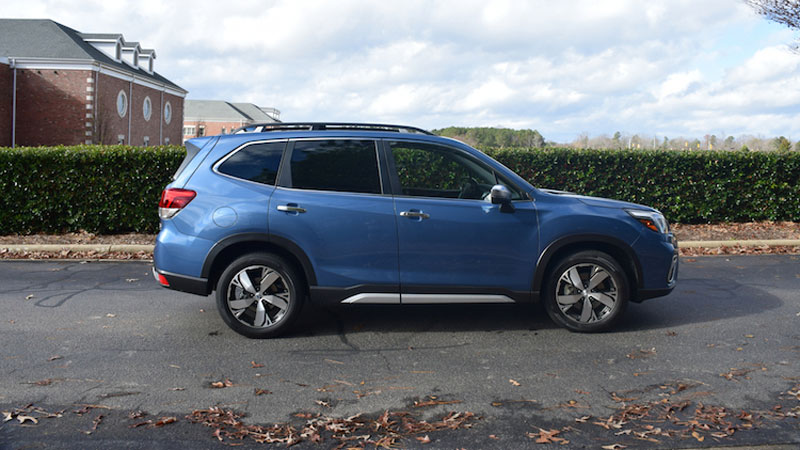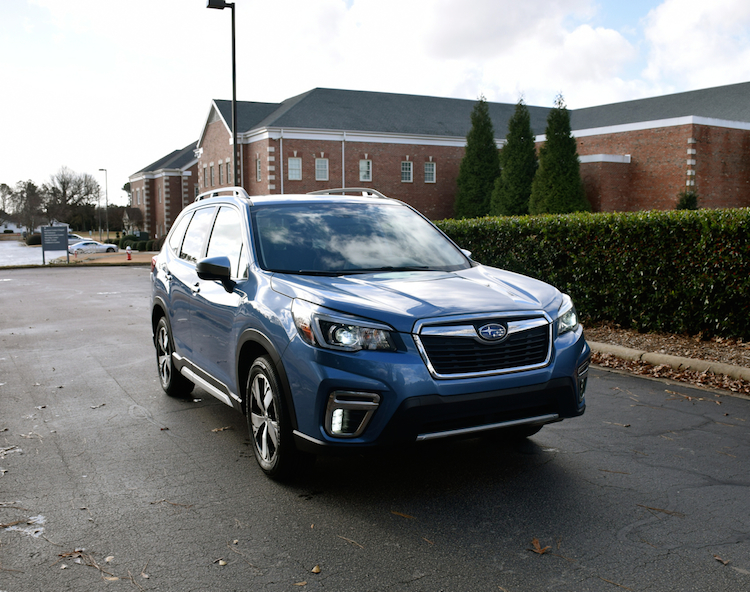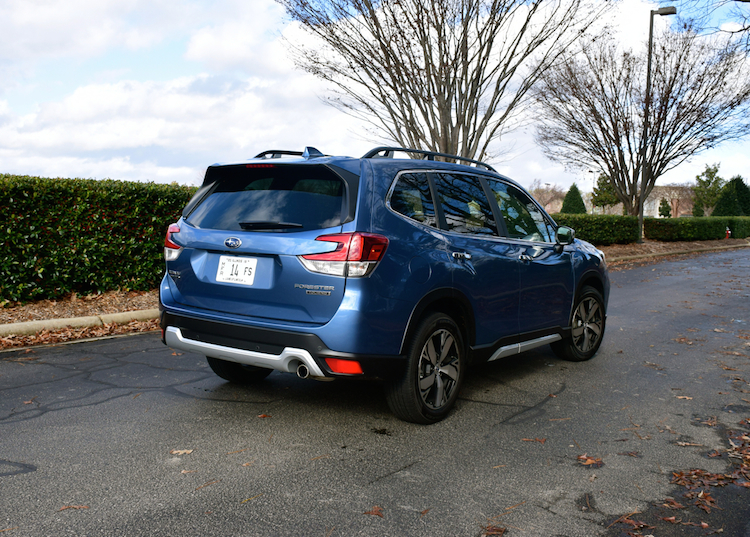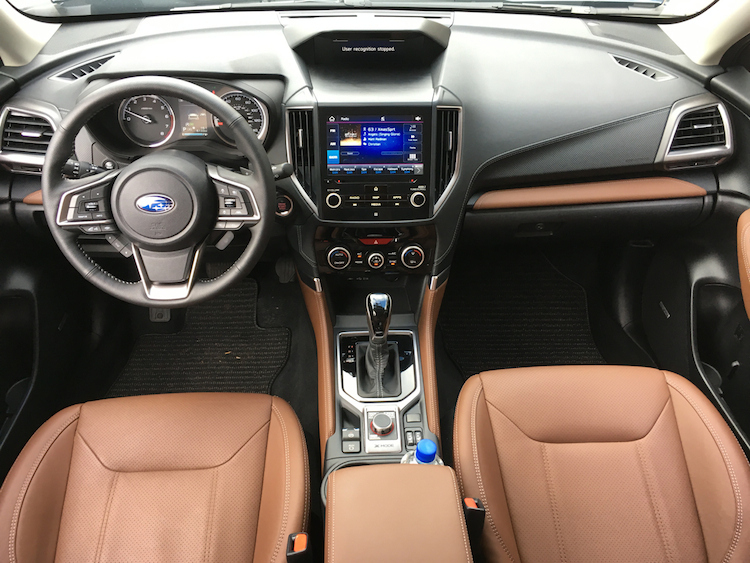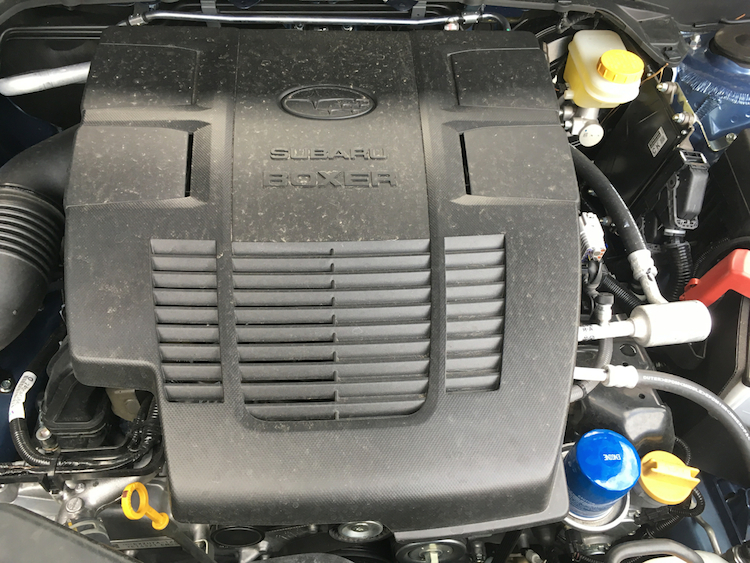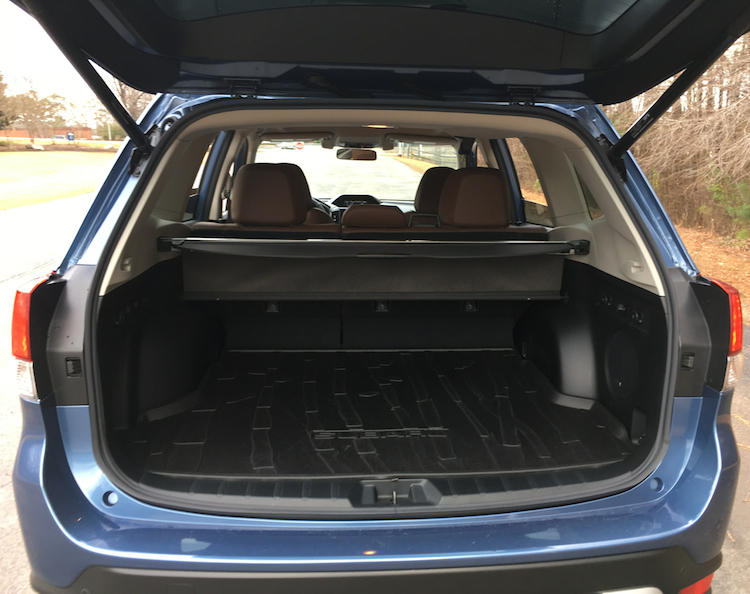When you offer a very successful product, how do you make improvements as you ready the next-generation model? Very carefully, that’s how.
Tasked with developing the fifth-generation Forester, Subaru turned to its new global architecture to support the vehicle, the same platform underpinning all modern Subaru models.
As a result, the 2019 Subaru Forester is slightly larger than before, therefore positioning this vehicle to stay relevant in a segment led by the Toyota RAV4, Nissan Rogue, and Honda CR-V. Among its competitors, the Forester continues as the only model with standard all-wheel drive.
2019 Subaru Forester Review
The changes for 2019 go beyond architecture and size to include an updated 2.5-liter inline four-cylinder engine (the previously available 2.0-liter engine is gone), a new Sport model, standard driver-assist technologies, and a panoramic power moonroof on all but the base trim.
For 2019, Subaru offers the Forester in Base ($24,295), Premium ($26,695), Sport ($28,795), Limited ($30,795), and Touring ($34,295) trims. Add a $975 destination charge in most states, with slightly different costs in 10 others. We’ll break down each trim before tackling our driving impressions.
Forester by Trims
If you’re looking for a revolutionary change with the all-new Forester, you’ll be disappointed. Then again, an evolutionary change works best with this popular model.
Here’s what you’ll find with the Forester’s now five trims:
1. Base
For a base model, the entry-level Forester delivers the goods. You get the same engine and all-wheel-drive system as the rest of the lineup. And that’s a good place to begin.
This model has LED headlights, 17-inch wheels set within all-season tires, and black folding side mirrors. Inside, you’ll find full power accessories, a tilt-and-telescopic steering column, automatic climate control, cloth seats, and a cargo-area underfloor storage compartment.
The Forester’s standard audio package includes four speakers. You’ll also find a 6.5-inch multimedia display.
One of the biggest features this year is standard EyeSight Driver Assist Technology. This package monitors traffic movement, adjusts cruise control, and supplies lane keep assist and sway warning.
It takes some getting used to as the warnings make their presence known. Few competitors match Subaru with comparable technologies or if they do, you’ll pay extra for them.
The only available package with this trim is an Alloy Wheel Package ($600, with 17-inch aluminum-alloy wheels and raised roof rails). Remember, this is the budget model — you’ll probably want to begin your search with the next trim.
2. Premium
The Premium trim brings in features from the Alloy Wheel Package and adds body-colored side mirrors, a roof spoiler, and a panoramic power moonroof.
Inside, you’ll find a 10-way power driver’s seat, an overhead console with dual LED map lights and sunglasses storage, a removable cargo area tray, and a six-speaker audio system. This model also gains a pair of front compartment USB ports.
At this trim you’ll find three package offerings. The first one is an All-Weather Package ($500, windshield wiper de-icer, heated side mirrors, and heated front seats).
The second choice builds on the first one by adding keyless entry with push-button start, and blind-spot detection with rear cross-traffic alert ($1,295). Building on the first two is a package that brings in a power rear liftgate ($1,845). Opt for the third package and your price stays just below $30,000.
3. Sport
Sport is the newest trim and resides in the middle of this model’s five-trim lineup. Among its top features are its 18-inch wheels with orange accents and a sport drive mode. It also has LED fog lights and heated side mirrors with turn signal indicators.
Inside, the Sport comes with sport cloth seating with orange stitching, heated front seats, and dual second-row USB ports. This trim also has keyless entry and push-button start.
You’ll find a pair of package offerings. The first one bundles blind-spot detection, rear cross-traffic alert, and reverse automatic braking with an 8-inch touchscreen ($795). The second one builds on the first, adding a power liftgate and a 9-speaker Harman Kardon audio system ($2,045).
4. Limited
Key features of the Limited edition include LED steering responsive headlights and 18-inch five-spoke aluminum-alloy wheels.
This trim also includes a power liftgate, leather-covered seats, and dual-zone climate control. You’ll find one package option only, which bundles such features as reverse automatic braking, a heated steering wheel, and navigation with the Harman Kardon audio system ($1,695).
5. Touring
As you might expect, the top-trim Touring edition found its way to my home. The usual practice of manufacturers is to deliver a top-trim model for media inspection, thus Subaru was on target.
This one, of course, pulls out all the stops, at least when it comes to the Forester. It might seem odd that a Forester costs as much as $35,000, but you get such advanced features as an 8-way power front passenger seat, heated outboard second-row seats, a power-controlled rear seat, and the Harman Kardon audio system.
Subaru also includes a reverse automatic braking system and a DriverFocus distraction mitigation system. The system works with EyeSight, delivering alerts if it senses you aren’t staying focused yourself.
This means you may receive a display warning accompanied by a chime, telling you to keep your eyes on the road. The system alerted me one time, underscoring how easy it is to become distracted while driving.
What Subaru doesn’t include here is a package, because, at $35,270, the Touring edition comes with many standard features. It also makes a compelling reason to move beyond the Premium model with its own package offering. For just $1,800 more, the upgrades seem worthwhile.
On the Road
The previous-generation Forester offered two engine choices and these were four-cylinder motors displacing 2.0- and 2.5-liters, respectively. For the latest model, Subaru discontinued the base engine and updated the larger one, which powers every 2019 Forester.
This one gains a slight boost in performance — 182 horsepower and 176 pound-feet of torque, up from the previous 174 hp. The current engine has a slightly higher compression ratio and delivers improved acceleration. As before, Subaru’s flat-four works with a continuously variable transmission.
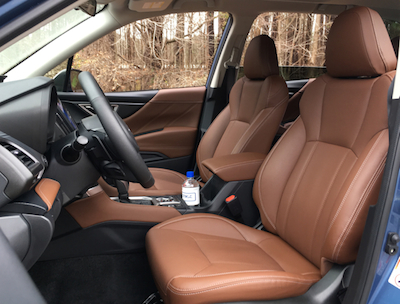
The Ford Escape is one model with multiple engine choices, in this case, three, but none matches the Forester’s efficiency.
One of the Forester’s strong suits is its acceleration, especially when traversing local roads. The Forester’s engine provides an immediate and even boost in power, although it does come at the cost of some droning.
The CVT manages to keep the engine revs in line, however, which also aids in efficiency. The ride is comfortable and steering is nicely weighted with responsive handling.
Indeed, Subaru supplies this model with torque-vectoring control, which delivers automatic braking to the inside wheels when cornering. You have to pay extra with competing models to get a similar reaction and even then the Subaru system seems more sophisticated.
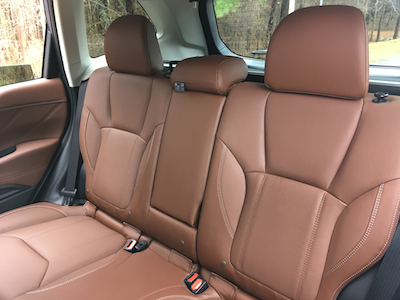
Off-roading is certainly do-able with the 2019 Forester. Its tall ground clearance, big tires, and an all-wheel-drive system just begs for off-road fun. When X-mode is activated, a hill descent feature kicks in. Further, the Forester’s traction management system mimics a locking differential arrangement along the lines of the Cherokee Trailhawk.
This is why you see Subarus doing things off road that unibody models typically avoid and live to tell about it. You may not be able to match the Trailhawk in climbing the toughest rock outpost, but your Subie should fly through the mud and navigate sand where others fear to tread.
Parting Thoughts
Rest assured, Subaru didn’t mess with success as they moved forward with an all-new Forester. And why should they? After all, the Forester is its best-selling model and any major design overhaul might adversely affect sales.
The new Forester simply strengthens the brand’s utility vehicle lineup, which is now composed of Crosstrek (subcompact), Forester (compact), Outback (two-row midsize), and Ascent (three-row midsize) models.
Customers are drawn to Subaru for several reasons, including its standard horizontally opposed (flat) engines, all-wheel drive, and advanced safety technologies.
Some consumers may not consider Subaru a value brand (as in cost), but the automaker’s roster of standard equipment demonstrates otherwise. Finally, if you place a value on off-road capabilities, few competing models deliver the chops on the level of the 2019 Subaru Forester.
|
See Also – All-Wheel Drive Edge: 2017 Subaru Legacy
Photos copyright Auto Trends Magazine. All rights reserved
- 2024 Mazda CX-50: A Compact SUV with Premium Aspirations - Apr 15, 2024
- 2024 Ford Mustang (Iconic Pony Car Evolves) - Apr 4, 2024
- 2024 Ford Maverick (Looks Like a Truck, Drives Like a Car) - Mar 28, 2024

